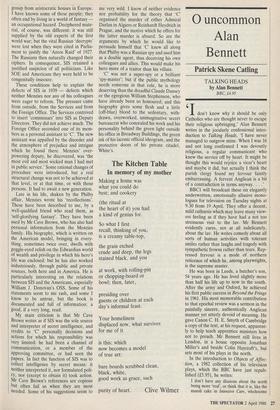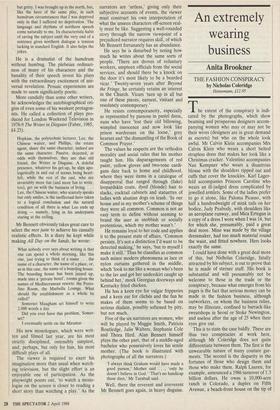0 uncommon Alan Bennett
Patrick Skene Catling
TALKING HEADS by Alan Bennett
BBC, f4.95
Idon't know why it should be only Catholics who are thought never to escape their religious upbringing,' Alan Bennett writes in the jocularly confessional intro- duction to Talking Heads, 'I have never managed to outgrow mine. When I was 16 and not long confirmed I was devoutly religious, a regular communicant who knew the service off by heart. It might be thought this would rejoice a vicar's heart and maybe it did, but actually I think the parish clergy found my fervour faintly embarrassing. A fervent Anglican is a bit of a contradiction in terms anyway. . .
BBC1 will broadcast these six elegantly underwritten, emotionally allusive mono- logues for television on Tuesday nights at 9.30 from 19 April. They offer a decent, mild catharsis which may leave many view- ers feeling as if they have had a not too strenuous visit to the lay. Mr Bennett evidently cares, not at all indelicately, about the lay. He writes comedy about all sorts of human activities with tolerant smiles rather than laughs and tragedy with sympathetic frowns rather than tears. Rep- ressed fervour is a mode of northern reticence of which he, among playwrights, is the supreme master.
He was born in Leeds, a butcher's son, 54 years ago. He has lived slightly more than half his life up to now in the south. After the army and Oxford, he achieved his first public success in Beyond the Fringe in 1961. His most memorable contribution to that epochal review was a sermon in the painfully sincere, authentically Anglican manner yet utterly devoid of meaning. He gave Canon C. H. E. Smyth of Cambridge a copy of the text, at his request, apparent- ly to help teach apprentice ministers how not to preach. Mr Bennett still lives in London, in a house opposite Jonathan Miller's and beside Colin Haycraft's, but sets most of his plays in the north.
In the introduction to Objects of Affec- tion, a 1982 collection of his television plays, which the BBC have just repub- lished (L5.95), he writes: I don't have any illusions about the north being more 'real', or think that it is, like the muesli cake in Intensive Care, wholesome
but gritty. I was brought up in the north, but, like the hero of the same play, in such humdrum circumstances that I was deprived only in that I suffered no deprivation. The language and rhythms of northern speech come naturally to me. Its characteristic habit of saving the subject until the very end of a sentence gives northern dialogue a tension lacking in standard English. It also helps the jokes.
He is a dramatist of the humdrum without humbug. The plebeian ordinari- ness of many of his characters and the banality of their speech invest his plays with the extraordinary excitement of uni- versal revelation. Prosaic experiences are made to seem significantly poetic.
More candidly than some other writers, he acknowledges the autobiographical ori- gins of even some of his weakest protagon- ists. He called a collection of plays pro- duced for London Weekend Television in 1978-9 The Writer in Disguise (Faber, 1985, £4.25).
Hopkins, the polytechnic lecturer, Lee, the Chinese waiter, and Phillips, the estate agent, share the same character, indeed are the same character. Passive, dejected, at odds with themselves, they are that old friend, the Writer in Disguise. A doleful presence, whatever his get-up, he slips apo- logetically in and out of scenes being heart- felt, while the rest of the cast, who are invariably more fun (and more fun to write, too), get on with the business of living. . . . Lee, the Chinese waiter, who scarcely speaks but only smiles, is the ineffectual hero taken to a logical conclusion and the natural condition of all three is what Lee ends up doing — namely, lying in his underpants staring at the ceiling.
Mr Bennett obviously takes great care to select the mot juste to achieve his casually realistic effects. In a diary he kept while making All Day on the Sands, he wrote:
What nobody ever says about writing is that one can spend a whole morning, like this one, just trying to think of a name . . . the name of a character, the name of a place, or, as in this case, the name of a boarding house. The boarding house has been jazzed up, made into a 'private hotel', rooms given the names of Mediterranean resorts: the Porto- fino Room, the Marbella Lounge. What should the establishment as a whole be called?
Somerset Maugham set himself to write 2,000 words a day.
Did you ever have this problem, Somer- set?
I eventually settle on the Miramar.
His new monologues, which were writ- ten and filmed last year, are his most strictly disciplined, ostensibly simplest, and, perhaps, but only for him, his most difficult plays of all.
The viewer is required to exert his imagination more than usual when watch- ing television, but the slight effort is an enjoyable one of participation. As the playwright points out, 'to watch a mono- logue on the screen is closer to reading a short story than watching a play.' As the narrators are 'artless,' giving only their subjective accounts of events, the viewer must construct his own interpretation of what the unseen characters off-screen real- ly must be like. Suggesting a well-rounded story through the narrow viewpoint of a prejudiced narrator requires skill, of which Mr Bennett fortunately has an abundance.
He says he is disturbed by noting how much he writes about the same sorts of people. 'There are droves of voluntary workers, umpteen officials from the social services, and should there be a knock on the door it's most likely to be a bearded vicar.' Twenty-seven years after Beyond the Fringe, he certainly retains an interest in the Church. Vicars 'turn up in all but one of these pieces, earnest, visitant and resolutely contemporary.'
He resists contemporaneity, especially as represented by parsons in pastel dress, nuns who have 'lost their old billowing, wimpled innocence and now look like prison wardresses on the loose,' grey hearses and 'the dismantling of the Book of Common Prayer.'
The values he respects are the orthodox morality and social rules that his mother taught him. His disparagements of red paint, yellow gloves and two-tone cardi- gans date back to home and childhood. where they were items in a catalogue of disapproval that ranged through (fake) leopardskin coats, dyed (blonde) hair to slacks, cocktail cabinets and statuettes of ladies with alsatian dogs on leash. 'In our house and in my mother's scheme of things they were all common. Common is not an easy term to define without seeming to brand the user as snobbish or socially pretentious, which my mother wasn't.'
He remains loyal to her code and applies it to the present state of affairs. 'Common persists. It's not a distinction I'd want to be detected making,' he says, 'but to myself I make it still.' Thus he classifies as common such minor modern phenomena as lace or nylon curtains gathered in the middle, which 'look to me like a woman who's been to the lay and got her underskirt caught up behind her,' mock Georgian doorways and Kentucky fried chicken.
He has a keen eye for vulgar fripperies and a keen ear for clichés and the fun he makes of them seems to be based on serious disdain, possibly softened by pity, but not much.
Five of the six narrators are women, who will be played by Maggie Smith, Patricia Routledge, Julie Walters, Stephanie Cole and Thora Hird. Alan Bennett himself plays the other part, that of a middle-aged bachelor who possessively loves his senile mother. (The book is illustrated with photographs of all the narrators.) 'I always think Graham would have made a
good parson,' Mother said . . 'only he doesn't believe in God.' That's no handicap these days,' Mr Turnbull said.
Well, there the reverent and irreverent Mr Bennett goes again, in heavy disguise.



















































 Previous page
Previous page